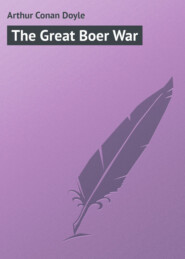 Полная версия
Полная версияПолная версия:
The Great Boer War
So much for the Empire. But what of South Africa? There in the end we must reap as we sow. If we are worthy of the trust, it will be left to us. If we are unworthy of it, it will be taken away. Kruger's downfall should teach us that it is not rifles but Justice which is the title-deed of a nation. The British flag under our best administrators will mean clean government, honest laws, liberty and equality to all men. So long as it continues to do so, we shall hold South Africa. When, out of fear or out or greed, we fall from that ideal, we may know that we are stricken with that disease which has killed every great empire before us.
Примечания
1
Later information makes it certain that the cavalry did report the presence of the enemy to Lord Methuen.
2
More than once I have heard the farmers in the Free State acknowledge that the ruin which had come upon them was a just retribution for the excesses of Natal.
3
The destruction of the Creusot was not as complete as was hoped. It was taken back to Pretoria, three feet were sawn off the muzzle, and a new breech-block provided. The gun was then sent to Kimberley, and it was the heavy cannon which arrived late in the history of that siege and caused considerable consternation among the inhabitants.
4
The Gordons and the Sappers were there that morning to re-escort one of Lambton's 4.7 guns, which was to be mounted there. Ten seamen were with the gun, and lost three of their number in the defence.
5
Accurate figures will probably never be obtained, but a well-known Boer in Pretoria informed me that Pieters was the most expensive fight to them of the whole war.
6
An officer in high command in Ladysmith has told me, as an illustration of the nerve and discipline of the troops, that though false alarms in the Boer trenches were matters of continual occurrence from the beginning to the end of the siege, there was not one single occasion when the British outposts made a mistake
7
A battery which turned out its horses to graze found that the puzzled creatures simply galloped about the plain, and could only be reassembled by blowing the call which they associated with feeding, when they rushed back and waited in lines for their nosebags to be put on.
8
There was something piteous in the chagrin of these fine Sikhs at being held back from their natural work as soldiers. A deputation of them waited upon Lord Roberts at Bloemfontein to ask, with many salaams, whether 'his children were not to see one little fight before they returned.'
9
De Montmorency had established a remarkable influence over his rough followers. To the end of the war they could not speak of him without tears in their eyes. When I asked Sergeant Howe why his captain went almost alone up the hill, his answer was, 'Because the captain knew no fear.' Byrne, his soldier servant (an Omdurman V.C. like his master), galloped madly off next morning with a saddled horse to bring back his captain alive or dead, and had to be forcibly seized and restrained by our cavalry.
10
Of the other two one overturned and could not be righted, the other had the wheelers shot and could not be extricated from the tumult. It was officially stated that the guns of Q battery were halted a thousand yards off the donga, but my impression was, from examining the ground, that it was not more than six hundred.
11
It may be urged in General Colvile's defence that his division had already done a long march from Bloemfontein. A division, however, which contains two such brigades as Macdonald's and Smith-Dorrien's may safely be called upon for any exertions. The gunner officers in Colvile's division heard their comrades' guns in 'section – fire' and knew it to be the sign of a desperate situation.
12
This was a remarkable exhibition of the harmlessness of shell-fire against troops in open formation. I myself saw at least forty shells, all of which burst, fall among the ranks of the mounted infantry, who retired at a contemptuous walk. There were no casualties.
13
Sunday cricket so shocked Snyman that he threatened to fire upon it if it were continued.
14
Mr. Leary was wounded in the foot by a shell. The German artillerist entered the hut in which he lay. 'Here's a bit of your work!' said Leary good-humouredly. 'I wish it had been worse,' said the amiable German gunner.
15
Further information unfortunately shows that in the case of the sick and of the Colonial prisoners the treatment was by no means good
16
Fragments continually met the eye which must have afforded curious reading for the victors. 'I hope you have killed all those Boers by now,' was the beginning of one letter which I could not help observing.
17
It is to be earnestly hoped that those in authority will see that these men obtain the medal and any other reward which can mark our sense of their faithful service. One of them in the Orange River Colony, after narrating to me his many hairbreadth escapes, prophesied bitterly that the memory of his services would pass with the need for them.]
18
Considering that Major Stapelton Cotton was himself wounded in three places during the action (one of these wounds being in the head), he has had hard measure in being deprived of his commission by a court-martial which sat eight months after the event. It is to be earnestly hoped that there may be some revision of this severe sentence.



